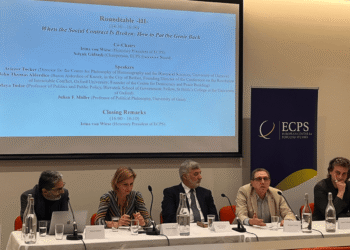By Aurelien Mondon
Despite the provocative statement made in the title, the aim of this article is not to argue that populism (studies) does not exist or that it cannot be a useful concept, or that there may not be space for a lively field of populism studies to develop. Yet the argument developed here is that it is only possible if our understanding of populism serves a purpose such as helping us make better sense of the world around us. If, on the contrary, the term is used to obscure, deflect and divert attention away from processes of power formation and consolidation, then populism and populism studies do not exist: they are a simulacrum, a con. To explore these issues, I first (re)engage with the concept of ‘populist hype’ originally developed with Jason Glynos (2016) and apply it more precisely to academia. I then turn to one key contradiction in populism studies whereby definitional debates are both incredibly lively and yet often used to conceal power. In both sections, I explore the way in which populism has often been conflated with the far right, losing its explanatory power and legitimising such politics. Finally, I conclude with some reflections on the future of populism studies.
***
The title of this article is a reference to Pierre Bourdieu’s 1973 lecture ‘Public opinion does not exist’ as it seems particularly fitting here. As Bourdieu explained ‘in saying that public opinion does not exist, I mean it does not exist in the form which some people, whose existence depends on this illusion, would have us believe’ (Bourdieu, 1973). This, in a nutshell, is the argument I deploy in this article with regard to populism and populism studies. My aim is not to argue that populism does not exist or that it cannot be a useful concept, or that there may not be space for a lively field of populism studies to develop. Yet this is only possible if our understanding of populism serves a purpose such as helping us make better sense of the world around us. If, on the contrary, the term is used to obscure, deflect and divert attention away from processes of power formation and consolidation, then populism and populism studies do not exist: they are a simulacrum, a con.
While definitional concerns are not core to the argument of this article, it is worth clarifying nonetheless that my work is generally closer to the discursive approach (see Stavrakakis et al., 2018; Katsambekis, 2016, 2020) than to Bourdieu’s. Here though, I would like to focus on the way we as academics use populism, our role in shaping ideas and public discourse, and the impact this has on society. As such, this article is indebted to and builds on an increasingly vibrant self-introspective field (Hunger and Paxton, 2021; Goyvaerts, 2021; Brown, 2022; Dean and Maiguashca, 2020; Eklundh, 2020; Katsambekis, 2020; Kim, 2021; De Cleen and Glynos, 2021). To do so, I first (re)engage with the concept of ‘populist hype’ originally developed with Jason Glynos (2016) and apply it more precisely to academia. I then turn to one key contradiction in populism studies whereby definitional debates are both incredibly lively and yet often used to conceal power. In both sections, I explore the way in which populism has often been conflated with the far right, losing its explanatory power and legitimising such politics. Finally, I conclude with some reflections on the future of populism studies.
See Full Text


